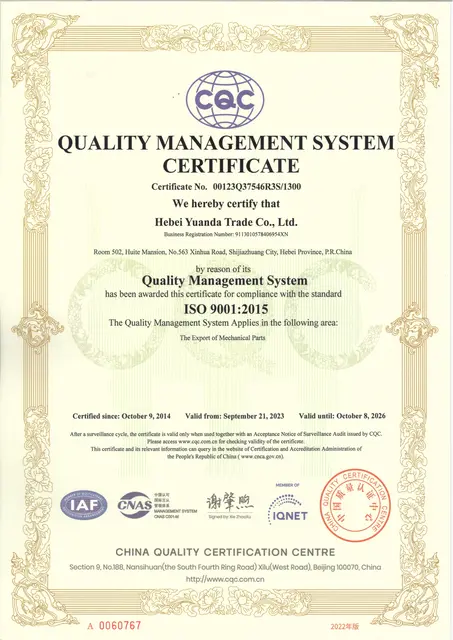Mobile:+86-311-808-126-83
Email:info@ydcastings.com
impeller on pump
The Importance of Impellers in Pump Functionality
Pumps are integral components in various industries, facilitating the movement of liquids or gases from one location to another. One of the most crucial parts of a pump is the impeller. The impeller is a rotating component designed to maximize the flow and pressure of the fluid being transported. Understanding how impellers work and their significance in pump efficiency can provide valuable insights into selecting and maintaining pumps for specific applications.
What is an Impeller?
An impeller is a mechanical device typically made of metal or plastic, characterized by a series of blades or vanes attached to a central hub. As the impeller spins, it harnesses kinetic energy from a power source (usually an electric motor) and transfers it to the fluid. The rotation of the impeller creates a low-pressure area at its center, causing the surrounding fluid to be drawn in. This process, known as fluid induction, efficiently moves the fluid from the inlet to the discharge.
Types of Impellers
There are several types of impellers, each designed to perform optimally under specific conditions. The most common types include
1. Closed Impeller This type features a cover plate, which helps to minimize leakage and increase efficiency. Closed impellers are suited for applications where high pressure is necessary.
2. Open Impeller Open impellers lack a cover plate, allowing greater flow passages. While they are less efficient than closed impellers, they are ideal for handling fluids with solid particles or in applications where high viscosity is present.
3. Semi-Open Impeller This design combines features of both closed and open impellers, providing a compromise in efficiency and the ability to handle various fluid types.
4. Multistage Impeller Designed with multiple impeller stages, this type enables higher pressure output, making it suitable for applications requiring the transport of fluids over long distances or to great heights, such as in water supply systems.
The Role of Impellers in Pump Efficiency
impeller on pump

The design and material of the impeller significantly influence pump performance. An effectively designed impeller can optimize hydraulic performance, minimize energy consumption, and reduce wear on pump components. Key factors affecting the efficiency of an impeller include
- Blade Design The shape, angle, and number of blades can greatly impact fluid dynamics. For instance, curved blades may enhance flow rates compared to straight blades.
- Diameter Larger-diameter impellers can move more fluid; however, they may also require more energy. Selecting the right diameter is crucial for balancing flow rate and energy efficiency.
- Material Impellers are often subjected to wear and corrosion due to fluid interaction. The choice of materials (such as stainless steel, bronze, or thermoplastics) should consider the fluid properties and environmental conditions.
Maintenance of Impellers
Regular maintenance of pumps and their impellers is vital for ensuring long-lasting performance. Common maintenance practices include
- Regular Inspections Checking for wear, corrosion, and any buildup of debris can help identify potential issues before they result in pump failure.
- Cleaning Keeping the impeller free from blockages ensures optimal fluid flow, making pump operation more efficient.
- Lubrication Depending on the design, ensuring that bearings and other moving parts are properly lubricated can reduce friction and wear.
Conclusion
In conclusion, the impeller is a critical component of pump systems, directly influencing their efficiency, performance, and maintenance needs. A well-designed, constructed, and maintained impeller can significantly optimize the fluid transfer process in a variety of settings, from industrial applications to residential water systems. By understanding the functions and types of impellers, engineers and operators can make informed decisions, ensuring the selection of the right pump for their specific needs and extending the lifespan of their equipment. As technology advances, ongoing innovations in impeller design and materials promise to further enhance pump efficiency in the years to come.
-
Why Should You Invest in Superior Pump Castings for Your Equipment?NewsJun.09,2025
-
Unlock Performance Potential with Stainless Impellers and Aluminum End CapsNewsJun.09,2025
-
Revolutionize Your Machinery with Superior Cast Iron and Aluminum ComponentsNewsJun.09,2025
-
Revolutionize Fluid Dynamics with Premium Pump ComponentsNewsJun.09,2025
-
Optimizing Industrial Systems with Essential Valve ComponentsNewsJun.09,2025
-
Elevate Grid Efficiency with High-Precision Power CastingsNewsJun.09,2025











